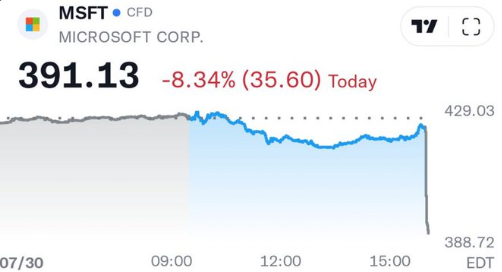In a surprising turn, Microsoft (MSFT) released its fiscal fourth-quarter earnings, beating Wall Street’s expectations on both earnings per share (EPS) and overall revenue. However, the company stumbled on cloud revenue forecasts, leading to a sharp decline in its stock price.
Microsoft stock drops over 6% after results fall short in latest AI disappointment
Also reports on global media channels of ongoing Azure Cloud problems re-surface post the Crowdstrike disaster
Microsoft falls -6% after market close as results disappoint… pic.twitter.com/N0HZvUEdTK
— Smalltalkdaily Research (@smalltalkdaily) July 31, 2024
For this quarter, Microsoft posted an EPS of $2.95, surpassing the anticipated $2.94, on a robust revenue of $64.7 billion. This compares favorably to the same period last year, where the company reported an EPS of $2.69 on $56.2 billion in revenue. Yet, despite these strong numbers, Microsoft’s cloud business didn’t fully deliver. The total cloud revenue reached $36.8 billion, aligning with expectations, but the key segment—Intelligent Cloud, which houses Azure services—came in at $28.5 billion, slightly below the projected $28.7 billion.
The market reacted swiftly, with Microsoft’s shares dropping over 7% in after-hours trading. This decline overshadowed the fact that the company’s overall revenue still saw a substantial 21% year-over-year increase. The Intelligent Cloud segment also grew by 19%, and notably, AI services contributed 8 percentage points to the growth of Azure and other cloud services, which experienced a 29% uptick.
The ripple effect of Microsoft’s earnings miss was felt across the tech industry, particularly hitting AI-centric stocks. Meta, for example, saw its shares dip more than 3% in after-hours trading.
Microsoft stock drops over 8% after reporting earnings, erasing approximately $260 billion in market cap🤨 pic.twitter.com/KSf7sMpXKR
— xoom (@Mr_Xoom) July 30, 2024
This comes in the wake of Alphabet’s (GOOG, GOOGL) recent earnings report, where the tech giant highlighted an increase in cloud revenue, partly fueled by rising interest in AI technologies. However, Alphabet was tight-lipped about the exact impact of AI on its cloud business, leading analysts like UBS’s Stephen Ju to suggest that significant revenue benefits from AI investments might not surface until 2025.
UBS analyst Karl Keirstead noted that Microsoft has been gaining market share at the expense of Google and Amazon, particularly due to its early advancements in AI. Keirstead mentioned that this trend has been consistently observed over the past 6-12 months, with Microsoft’s Azure platform showing relative strength.
Alphabet’s CFO, Ruth Porat, disclosed during their earnings call that the company spent $13 billion on capital expenditures this quarter, up from $12 billion in the previous one, with most of the spending directed towards AI.
Looking ahead, Amazon (AMZN) is scheduled to report its earnings on August 1. So far this year, Google’s shares have climbed by 22%, while Amazon’s have risen by 23%.
Microsoft stock drops over 2% in premarket trading after results fall short in latest AI disappointment$MSFT#AInvest #Ainvest_Wire #liveanalysis #Finance #USstock
View more: https://t.co/whqRffFXE6 pic.twitter.com/pWR7bF9PtR— AInvest Wire (@Ainvest_Wire) July 31, 2024
Major Points:
- Microsoft reported an EPS of $2.95 and revenue of $64.7 billion, surpassing Wall Street’s predictions of $2.94 EPS and $64.5 billion in revenue.
- While total cloud revenue met expectations at $36.8 billion, the Intelligent Cloud segment, including Azure services, fell short, reporting $28.5 billion versus the anticipated $28.7 billion.
- Following the earnings report, Microsoft’s shares fell over 7% in after-hours trading, despite a 21% year-over-year increase in total revenue.
- Microsoft’s miss on cloud expectations impacted other AI-heavy stocks, with Meta experiencing a more than 3% decline in after-hours trading.
- Despite challenges, Microsoft continues to gain market share from competitors like Google and Amazon, partly due to its early advancements in AI technologies.
RM Tomi – Reprinted with permission of Whatfinger News



